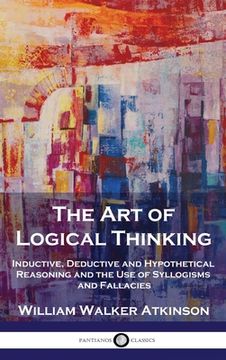Compartir
The Art of Logical Thinking: Inductive, Deductive and Hypothetical Reasoning and the Use of Syllogisms and Fallacies (en Inglés)
William Walker Atkinson
(Autor)
·
Pantianos Classics
· Tapa Dura
The Art of Logical Thinking: Inductive, Deductive and Hypothetical Reasoning and the Use of Syllogisms and Fallacies (en Inglés) - Atkinson, William Walker
30,23 €
31,82 €
Ahorras: 1,59 €
Elige la lista en la que quieres agregar tu producto o crea una nueva lista
✓ Producto agregado correctamente a la lista de deseos.
Ir a Mis Listas
Origen: Estados Unidos
(Costos de importación incluídos en el precio)
Se enviará desde nuestra bodega entre el
Miércoles 12 de Junio y el
Lunes 01 de Julio.
Lo recibirás en cualquier lugar de España entre 1 y 5 días hábiles luego del envío.
Reseña del libro "The Art of Logical Thinking: Inductive, Deductive and Hypothetical Reasoning and the Use of Syllogisms and Fallacies (en Inglés)"
William Walker Atkinson, an attorney by trade, explains different kinds of logic and reasoning - deductive, inductive and hypothetical.The author begins by describing how the mind forms ideas and concepts, and then subjects these to the mental processes of higher reasoning. The memory stores a repository of terms, which are different from concepts in that they apply exclusively to the name of things. Through reasoning the mind can arrive at a judgment of a given thing or idea, and through simple distinction can reject what is false - for instance, the notion that a horse is a cow.Moving on from these simple examples, Atkinson describes how complex judgments and analyses are formed by the mind. Piecing together an accurate chain of events forms a kind of inductive reasoning - for example, if several people enters a store empty-handed, and later emerge with bags of fruit and vegetables, is it sensible to infer that it is a grocery store. Deriving conclusions from facts and events is forming a hypothesis; with the use of information, assertions can be made to arrive at a sensible conclusion - without personally entering said store, based on known facts it is credible to hypothesize that it sells groceries.

